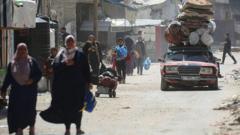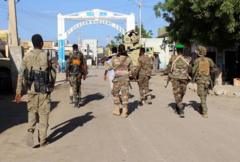Amidst renewed military operations, Israel expands its security zones to encompass Rafah, impacting the safety and humanitarian situation for the area's residents. Displacement, evacuations, and international criticism highlight the ongoing complexities of the conflict.
Israel Expands Security Zones in Gaza, Including Rafah

Israel Expands Security Zones in Gaza, Including Rafah
Israeli Defence Minister announces Rafah's inclusion in the military's designated "security zones" amid ongoing conflict with Hamas.
Israel's Defence Minister, Israel Katz, has declared that Rafah, a city in southern Gaza, will now fall under the military's expanded "security zones" as part of a strategy to increase pressure on Hamas. This move follows the Israeli military's assertion that it aims to leave Gaza "smaller" and "more isolated," utilizing tactics designed to encourage the release of hostages held by the militant group.
In recent weeks, the military has taken control of vast stretches of land along Gaza's borders, designating these areas as buffer zones to mitigate potential attacks. With the new measures, approximately one-fifth of Gaza, including Rafah and surrounding territories, is affected by evacuation orders. The United Nations reports that since Israel's renewed offensive on March 18, nearly 390,000 Palestinians have been displaced, exacerbating an already dire humanitarian situation. The UN also indicates that food, medicine, and fuel supplies have been severely hampered due to the blockade on aid deliveries since early March.
Rafah, which was home to around 280,000 people prior to the conflict, was heavily impacted during Israeli offense last May, which resulted in significant destruction. Although a temporary ceasefire allowed some residents to return in January, many were urged to evacuate again following Israel's military directives that covered nearly the entire governorate of Rafah. With the establishment of new planned evacuation routes, the situation has forced many displaced persons into makeshift tent camps, adding further strain on already limited resources.
During a recent visit to Rafah, Defence Minister Katz emphasized the military's objectives, stating that the Israel Defence Forces (IDF) are "eliminating terrorists" while establishing operational control over relocated areas. He warned of intensified operations if Hamas does not respond favorably regarding the hostages. He confirmed claims that Rafah will be made a total "security area," further tightening the restrictiveness of the footprint of Palestinian habitation in Gaza.
The Israeli government argues that these measures are necessary to protect civilians from Hamas, which they accuse of using residents as human shields. However, many international bodies, including the UN, have critiqued such evacuation orders, claiming they violate international law due to a lack of adequate provisions for those displaced. Local reports suggest the IDF's operations are driven by a strategy to focus Palestinian populations towards coastal areas, thereby centralizing control over humanitarian aid.
As these developments unfold, the Israeli military has continued its offensive, including recent strikes reported to have resulted in civilian casualties among residents of Gaza City. This ongoing conflict, ignited by a sudden attack on Israel in October 2023, has led to staggering casualties—over 50,880 deaths reported by Gaza's health authorities, raising critical concerns regarding the humanitarian implications of ongoing military actions.



















